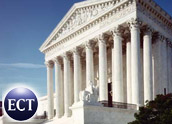
With powerful forces pulling for both sides in the battle over cable regulation, the U.S. Supreme Court is set to consider this week a matter that brings to a head the debate on how to govern today’s converging telecommunications and information services.
The high court tomorrow hear arguments in the case — a dispute between the Federal Communications Commission and Internet service provider Brand X, which has challenged the FCC’s cable modem rules.
Shielding Cable
The case relates broadly to the FCC’s regulation of telecom carriers and Internet providers. Traditionally, the major telecoms, known as the regional Bells, have been required to share portions of their networks with competitors, particularly for DSL services. The FCC has categorized cable modem service differently, however, ruling in 2002 that it should be considered an information service, not subject to the same rules as telecom services. Brand X Internet and other ISPs appealed that ruling, and in October 2003, the Ninth U.S. Circuit Court of Appeals overturned the FCC’s decision.
Telephone companies and others have argued that cable companies should be regulated and subject to the same fees that are paid by traditional telecom companies, but the FCC and U.S. Congress have so far held that less regulation for cable will help drive competition and broadband growth.
Companies on the other side, most of which are ISPs that face broadband Internet competition from cable providers, have argued that the only way to truly drive competition is by opening cable company lines to competing ISPs.
Now, Brand X leads the charge as ISPs look to the Supreme Court to require that broadband cable providers share their networks. Analysts indicated that the industry is split on the issue based on companies’ specific interests. They were uncertain, however, whether the court will change or clarify how different communication services are regulated in the U.S.
“It’s going to be a legal interpretation, so it’s going to be hard to predict,” Gartner analyst Ron Cowles told TechNewsWorld. “What we’re hearing in the industry is, the various parties are lining up around what is in their best interests.”
Best for Industry
A key case also up for consideration by the Supreme Court is a dispute between the City of Portland, Ore., and AT&T in which the cable provider was ruled to be both a telecom and information service by the Ninth Circuit.
Now that the FCC’s appeal of that decision has reached the Supreme Court, there is speculation that the court might change how the various service providers — almost all of which are selling multiple phone, Internet and television offerings — are legally defined.
Gartner’s Cowles — whose research firm called for the FCC’s hands-off approach to continue and be extended to other information services provided by telecom companies — indicated that less regulation of information services was best for the industry.
“Cable companies and DSL providers — mostly the telephone companies — support overturning the Ninth Circuit decision, for obvious reasons,” he said. “And consumer advocates, ISPs and most municipalities support open access and the Ninth Circuit decision.”
Gartner said although it agrees with the FCC’s desire to de-regulate Internet access services, the Ninth Circuit decision does not prevent it, given that the FCC could choose not to regulate cable modem, DSL and VoIP, just as it has with cable television andwireless services.
“Even if it exercises its forbearance authority, the FCC could still require service providers to meet certain obligations to promote the public interest, such as local portability, emergency 911 connections and compliance with the Communications Assistance for Law Enforcement Act,” a Gartner report said.
One Way
Forrester analyst Lisa Pierce said regardless of how the Supreme Court rules on the cable question, the best thing for the industry would be to treat all of the different services in the same way.
“I really wish — and don’t care which way it goes — there was one set of rules that applied to communications,” she told TechNewsWorld. “It would be better for competition because there would be a single set of rules. Who cares what they are — it’s one set of rules. That could really help the spread of new communications technology.”
Pierce, who called Congressional action that prevents FCC regulation of cable “unfortunate,” added that the central issue before the Supreme Court now is whether there is any legal framework to change the current state of affairs.





















































